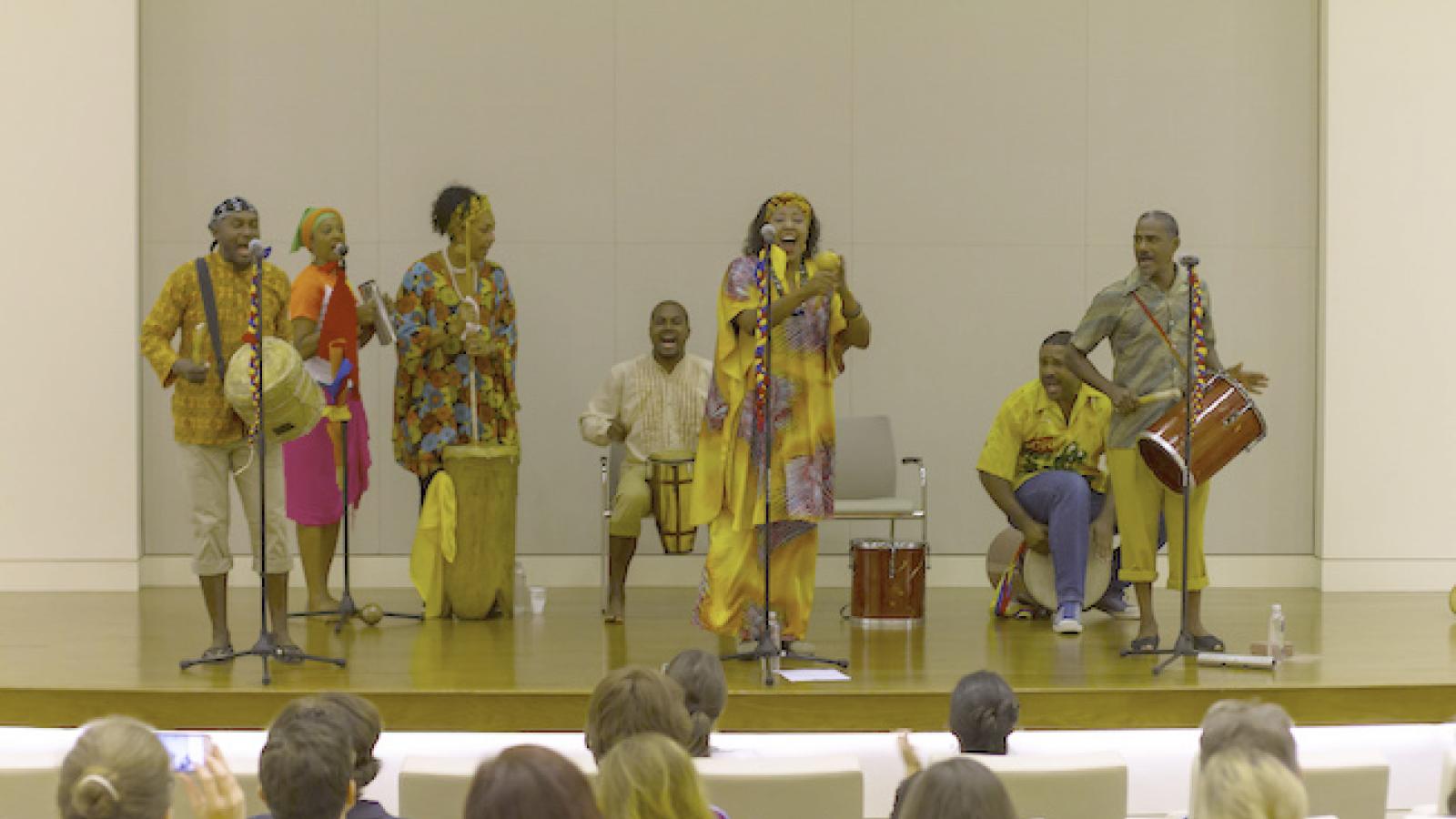Betsayda Machado: The Voice of Venezuela (in English and Spanish)

Today, we get to hear from Afro-Venezuelan singer Betsayda Machado. Twice. That's right, folks. Two blogs for the price of one. Well, two audio stories. The first in English, the second in Spanish. In mid-October, at the tail end of Hispanic Heritage Month, Betsayda Machado and the electrifying group Parranda El Clavo stopped by the NEA and NEH's offices to perform. Parranda literally means party and El Clavo is the town they're from in Barlovento. And El Clavo brought the party alright. The band managed to get bureaucrats out of their seats and onto a makeshift dance floor during their lunch break. Typically, Parranda El Clavo travels from small town to small town, performing earth-shaking songs for the people of Venezuela. But thanks to the international presenting program called Southern Exposure, the groups audiences are growing well outside their home state of Miranda. Machado and Parranda El Clavo is a part of the program, Southern Exposure.
Administered by the Mid-Atlantic Arts Foundation with support from the NEA, Southern Exposure is a national initiative that brings contemporary and traditional performing arts from Latin America to audiences across the United States. It provides fee support to nonprofit presenters who book artists on a curated roster that changes annually.
In the first audio piece, Betsayda is joined by producer and the band's manager Juan Souki. In fact, Souki produced their debut album, Loé Loá: Rural Recordings Under the Mango Tree. The two share how they met and shed light on the importance and power of this very particular kind of Afro-Venezuelan soul music known as tambor. In the second Spanish-only story, Betsayda shares more details about her life, her music, and the rough situation in her homeland.
Hoy escuchamos a la cantante afrovenezolana Betsayda Machado. Dos veces. Así es, amigos, son dos blogs por el precio de uno! Bueno, dos historias de audio. La primera en inglés, la segunda en español. A mediados de octubre, al final del Mes de Patrimonio Hispano, Betsayda Machado y el electrizante grupo Parranda El Clavo pasaron por las oficinas de NEA y NEH para cantar. Parranda significa “fiesta” y El Clavo es la ciudad donde provienen. Y El Clavo verdaderamente trajo una fiesta! Durante la hora del almuerzo, el grupo logró sacar a los burócratas de sus asientos y ponerlos en una improvisada pista de baile. Típicamente, Parranda El Clavo viaja a pueblos pequeños cantando canciones emotivas para la gente de Venezuela. Pero gracias al programa de presentación internacional, Southern Exposure, su audiencia ha crecido vastamente desde su estado natal de Miranda. Machado y Parranda El Clavo forman parte del programa Southern Exposure.
Administrado por Mid-Atlantic Arts Foundation con el apoyo financiero del NEA, Southern Exposure es una iniciativa nacional que ofrece artes escénicas contemporáneas y tradicionales de América Latina a audiencias en todos los Estados Unidos. Brinda soporte de tarifas a los presentadores sin fines de lucro que reservan artistas de una lista comisariada que cambia anualmente.
En la primera pieza de audio, Betsayda se une al productor y manager del grupo, Juan Souki. De hecho, Souki produjo su primer álbum, Loé Loá: Rural Recordings Under the Mango Tree. Los dos comparten cómo se conocieron y hablan sobre la importancia y el poder de este tipo de música soul afrovenezolana, muy particular, conocida como tambor. En el segundo cuento, únicamente en español, Betsayda comparte más detalles sobre su vida, su música y la situación difícil en su tierra natal.
A big, very warm thanks to Guiomar Ochoa for not only organizing the band's performance in our office auditorium, but also for her excellent translation skills. Muchas gracias a Guiomar Ochoa por haber organizado el concierto del grupo en nuestra oficina, y también por su ayuda en la traducción.




